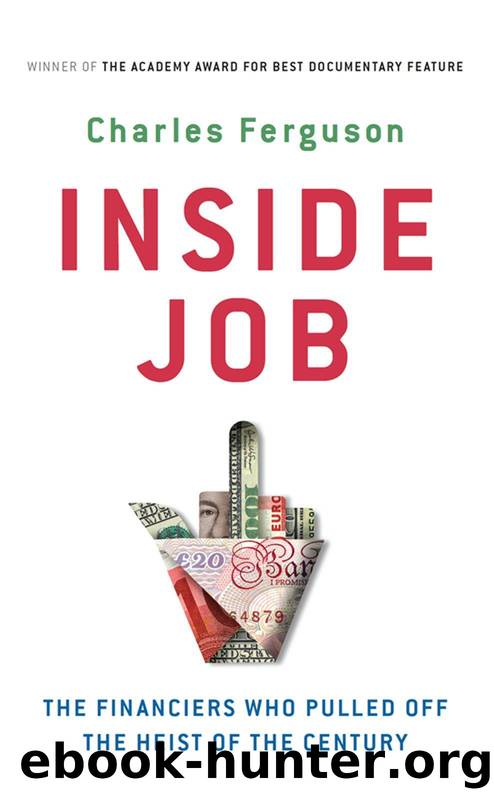Inside Job by Charles Ferguson

Author:Charles Ferguson
Language: eng
Format: mobi, epub
ISBN: 185168915X
Publisher: Oneworld Publications
Published: 2012-05-23T22:00:00+00:00
The Financial Crisis as the logical Culmination of Financial Criminalization
TAKEN TOGETHER, THE foregoing suggests a major cultural change in global banking, and in its treatment by regulators and law enforcement authorities. Since the 1980s finance has become more arrogant, more unethical, and increasingly fraudulent. Tolerance of overtly criminal behaviour has now become broadly, structurally embedded in the financial sector, and has played a major role in financial sector profitability and incomes since the late 1990s. In some cases, financial misbehaviour has supported truly grave offences (nuclear weapons proliferation), while in other cases it has been a major contributor to financial instability and recession (the S&L crisis, the Internet bubble).
And yet none of this conduct was punished in any significant way. Total fines for all these cases combined appear to be far less than 1 percent of financial sector profits and bonuses during the same period. There have been very few prosecutions and no criminal convictions of large US financial institutions or their senior executives. Where individuals not linked to major banks have committed similar offences, they have been treated far more harshly.
Given this background, it is difficult to avoid the conclusion that the mortgage bubble and financial crisis were facilitated not only by deregulation but also by the prior twenty yearsâ tolerance of large-scale financial crime. First, the absence of prosecution gradually led to a deeply embedded cultural acceptance of unethical and criminal behaviour in finance. And second, it generated a sense of personal impunity; bankers contemplating criminal actions were no longer deterred by threat of prosecution.
My own conclusion after having examined this subject is that if the Internet bubble, the abetting of frauds at Enron and elsewhere, and the money-laundering scandals had resulted in prison sentences for senior financial executives, the financial crisis probably would have been far less serious, even if financial deregulation had occurred just as it did at the policy level. The law still leaves considerable scope for dangerous and unethical behaviour, but many of the abuses of the bubble depended upon criminality.
And just as the last twenty years of unpunished crime constituted a green light for the bubble, so, too, the nonresponse to the bubble and crisis is setting the tone for financial conduct over the next decade. Beyond an interest in justice for its own sake, it is therefore important to consider whether the behaviour that generated the bubble was criminal, whether successful prosecutions are feasible under US law, and whether putting senior financial executives in prison on a large scale would be ethically justified and economically beneficial.
The Obama administration has rationalized its failure to prosecute anyone (literally, anyone at all) for bubble-related crimes by saying that while much of Wall Streetâs behaviour was unwise or unethical, it wasnât illegal. Here is President Obama at a White House press conference on 6 October 2011:
Well, first on the issue of prosecutions on Wall Street, one of the biggest problems about the collapse of Lehmans [sic] and the subsequent financial crisis and the whole subprime lending
Download
This site does not store any files on its server. We only index and link to content provided by other sites. Please contact the content providers to delete copyright contents if any and email us, we'll remove relevant links or contents immediately.
The Motivation Myth by Jeff Haden(4528)
Audition by Ryu Murakami(4099)
Adulting by Kelly Williams Brown(3671)
The Confidence Code by Katty Kay(3566)
Waiting in the Wings by Melissa Brayden(2805)
A Mind For Numbers: How to Excel at Math and Science (Even If You Flunked Algebra) by Barbara Oakley(2691)
Self-Esteem by Matthew McKay & Patrick Fanning(2603)
Nice Girls Don't Get the Corner Office by Lois P. Frankel(2594)
The ONE Thing by Gary Keller(2519)
The Dictionary of Body Language by Joe Navarro(2430)
Fooled by Randomness: The Hidden Role of Chance in Life and in the Markets by Nassim Nicholas Taleb(2413)
How to be More Interesting by Edward De Bono(2356)
Getting Things Done by David Allen(2319)
Designing Your Life by Bill Burnett(2265)
The Plant Paradox by Dr. Steven R. Gundry M.D(2040)
Police Exams Prep 2018-2019 by Kaplan Test Prep(2033)
What Color Is Your Parachute? 2015 by Richard N. Bolles(1929)
Dangerous Personalities by Joe Navarro(1894)
When to Jump by Mike Lewis(1808)
